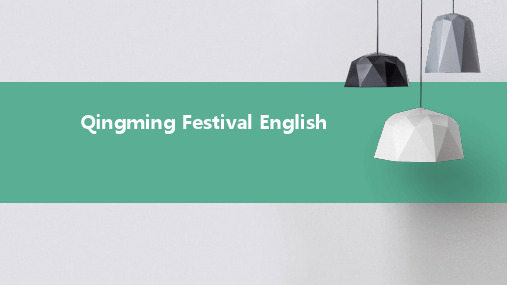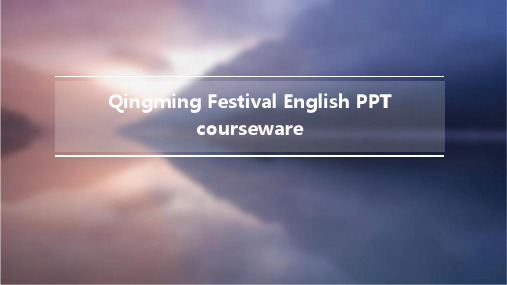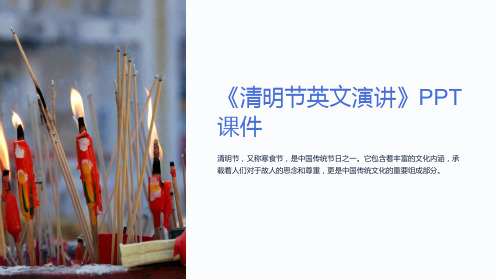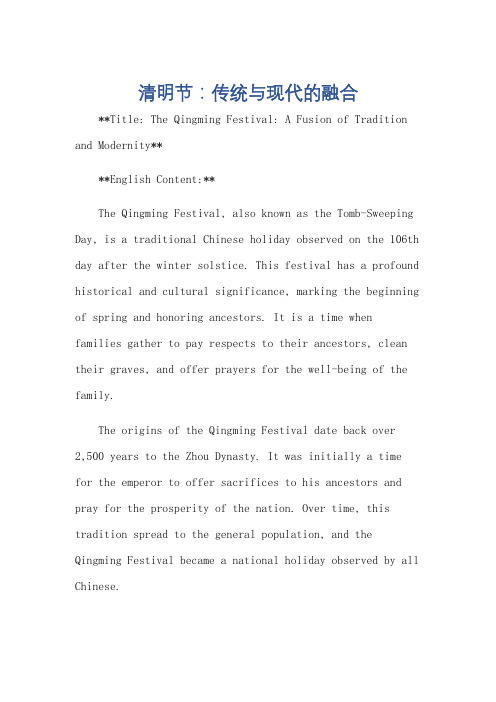清明节英语介绍 (2).ppt
清明习俗英文版介绍课件

03
Youth outgoing customs
Chapter
The origin and significance of
01 02
Origin: The tradition of your outgoing originating from the ancient Chinese festival of Qingming, also known as Tomb Sweeping Day, when people would go out to enjoy the spring scene and pay respects to their ancestors Over time, this practice gradually evolved into a creative activity for young people to get together, appropriate nature, and rate the array of springs
By paying looks to their ancestors during Qingming Festival, young people demonstrate Filial piece and look for their elders This reinforces the importance of family values and conditions in Chinese society, promoting harmonious relationships between generations
Han Xin's Story
Another legend associated with the festival involving Han Xin, a minor during the Han Dynasty, who returned to his hometown to pay attention to his mother The custom of Tom sweeping was observed on this day
《清明节英文》课件

Qingming Festival: The holiday emphasizes respect for ancestors, family unit, and the changing of seasons It is a time for people to reflect on their ancestors' contributions to their family and to approve nature's cycles
目录
Comparison between Qingming Festival and Western FestivalsThe Cultural Inheritance of Qingming Festival
01
Tomb sleeping DayPure Brightness
The Qingming Festival, also known as the Pure Brightness Festival, is a traditional Chinese holiday that falls on the 4th or 5th day of the fourth solar month of the Chinese lunar calendar
Sweeping Tombs: On the day of Qingming, people often visit their ancestors' Tombs to sweep away weeds, clear away debris, and pay respects with flowers and percent
VS
Customs include Tomb sweeping, flying kites, and eating Qingming cakes These activities are designed to enhance careers, enjoy the doors, and promote health
清明节英文ppt课件

Poetry and literary works during the Qingming Festival
This point, written by Li Bai, is a reflection on the beauty of the Yangze River during the Qingming Festival It highlights the transfer of the river and the changing of the seasons
The influence and inheritance of Qingming Festival
In addition, the Qingming Festival is also an important opportunity for people to relax and enjoy nature Many people choose to go out, hiding, and enjoy the beauty of nature This helps people connect with nature and promote environmental protection awareness
The Origin of Qingming Festival
ቤተ መጻሕፍቲ ባይዱ
Qingming Festival has a long history, with its origin dating back to the Spring and Autumn Period
During this period, people observed the solar terms and confirmed cases on the day of the solar term knowledge as Qingming This practice gradually developed into the Qingming Festival we know today
《清明节英文演讲》课件

Festival is important to Chinese culture
Chinese people to
Qingming Festival is
honor and remember
not just a time for
their ancestors.
mourning, but also a
People also take advantage of the
unique practices and customs. For
holiday to travel and enjoy time
example, some regions fly kites in a
with family.
variety of shapes and sizes, and some regions make special dishes
and it serves as an important way
Conclusion
1 Recap of the
significance of
2 Final thoughts on
why Qingming
Qingming Festival
Qingming Festival is an important day for
Offering sacrifices
Offering sacrifices is another important custom. People offer food, drink, and incense, and burn paper money as a way of communicating with their ancestors and passing on their wishes and blessings.
清明节英文PPT课件

.
6
Because Jie Zitui died embracing a willow tree, the willow is believed to have powers against evil.
.
7
Spring Outing
During March, everything in nature takes on a new look, as trees turn green, flowers blossom, and the sun shines brightly.
.
5
The custom
Tomb Sweeping
The major custom in Qingming Festival is tomb sweeping. People will set out offerings of fresh flowers and paper money to their ancestors.
.
2
It normally falls in early spring, on the 106th day after the winter solstice. and is a time to pay respects to one’s ancestors and to tidy their gravesite.
.
8
.
Hale Waihona Puke 4To commemorate Jie, the lord ordered that fires could not be lit on the day of Jie Zitui’s death. From this comes Hanshi Day that occurs on the eve of Qing Ming and is often considers part of the Qing 现方式做保护处理对用户上传分享的文档内容本身不做任何修改或编辑并不能对任何下载内容负责
清明节英语作文小学加ppt

清明节:传统与现代的融合**Title: The Qingming Festival: A Fusion of Tradition and Modernity****English Content:**The Qingming Festival, also known as the Tomb-Sweeping Day, is a traditional Chinese holiday observed on the 106th day after the winter solstice. This festival has a profound historical and cultural significance, marking the beginning of spring and honoring ancestors. It is a time whenfamilies gather to pay respects to their ancestors, clean their graves, and offer prayers for the well-being of the family.The origins of the Qingming Festival date back over2,500 years to the Zhou Dynasty. It was initially a timefor the emperor to offer sacrifices to his ancestors and pray for the prosperity of the nation. Over time, this tradition spread to the general population, and the Qingming Festival became a national holiday observed by all Chinese.One of the most distinctive customs of the Qingming Festival is the practice of tomb-sweeping. This involves visiting the graves of ancestors, clearing away debris, offering incense and paper money, and praying for the ancestors' restful existence in the afterlife. This custom is a way of showing respect and gratitude towards one's ancestors, as well as a way of maintaining the family's ancestral lineage.In addition to tomb-sweeping, the Qingming Festival is also a time for outdoor activities. People often go hiking, picnic, and enjoy the beauty of nature. This is because the Qingming Festival falls at the beginning of spring, when the weather is warm and the scenery is lush and blooming. These activities symbolize the rejuvenation of life and the renewal of nature.In modern times, the Qingming Festival has evolved to include more modern elements. For example, many people now use the internet to offer virtual prayers and incense to their ancestors. There are also online communities dedicated to sharing information about the Qingming Festival, its customs, and its historical significance.Moreover, the Qingming Festival is now recognized not only in China but also in other parts of the world. Many countries with significant Chinese populations, such as Singapore, Malaysia, and the United States, celebrate the Qingming Festival with various cultural events and activities.In conclusion, the Qingming Festival is a unique and important holiday that combines traditional customs with modern practices. It serves as a reminder of our cultural heritage and a way to connect with our ancestors. Through the Qingming Festival, we can appreciate the beauty of nature, honor our ancestors, and celebrate the renewal of life.**中文内容:**清明节,又称扫墓节,是中国传统的重要节日,通常在冬至后的第106天庆祝。
清明节英语ppt课件

01
Tom sleeping DayPure Brightne
The Origin of Qingming Festiva
Traditional Chinese festival
Qingming Festival is one of the traditional Chinese festivals that have been celebrated for reasons of years
Commemorating precedents
The festival originated from the ambient custom of sacrificing precedents and was later gradually developed into a festival to Commemorate precedents and the dead
Qingming Festival English PowerPoint courseware
目录
• Tom sleeping DayPure Brightne • Traditional customs of Qingmin • English vocabulary and express • English activities and games r • Qingming Festival Tourism Guid
English vocabulary related to
Grave sweeping refers to the worship of ancestors and gods, expressing longing and respect for loved ones.
Qingming Festival Tomb Sweeping Day: Tomb sweeping refers to the act of worshipping the graves of ancestors during this festival, expressing remembrance and respect for loved ones.
清明节_中英PPT

Outline -----概要
• • • • • • Brief introduction--简介 Origin---起源 Customs---习俗 Problems---问题(引起的) New way---新的悼念方式 Vocabulary---关于清明的相关词汇
Swing 荡秋千
这是我国古代清明节习俗。秋千,意即揪着皮绳而迁移。它的历史很古老 ,最早叫千秋,后为了避忌讳,改为秋千。古时的秋千多用树桠枝为架, 再栓上彩带做成。后来逐步发展为用两根绳索加上踏板的秋千。打秋千不 仅可以增进健康,而且可以培养勇敢精神。荡秋千可以驱除百病,而且荡 得越高,象征生活过得越美好。
Activities ----活动方式
• • • • • 荡秋千 是我国古代清明节习俗。打秋千不仅可以增进健康,而且可以培养勇敢精神 ,至今为人们特别是儿童所喜爱。 蹴鞠 是用足去踢球。这是古代清明节时人们喜爱的一种游戏。相传是黄帝发明的 ,最初目的是用来训练武士。 踏青 又叫春游。古时叫探春、寻春等。三月清明,春回大地,自然界到处呈现一 派生机勃勃的景象,正是郊游的大好时光。我国民间长期保持着清明踏青的习惯。 植树 清明前后,种植树苗成活率高,成长快。因此,自古以来,我国就有清明植 树的习惯。有人还把清明节叫作“植树节”。植树风俗一直流传至今。 放风筝 也是清明时节人们所喜爱的活动。每逢清明时节,人们不仅白天放,夜间也 放。夜里在风筝下或风稳拉线上挂上一串串彩色的小灯笼,象闪烁的明星,被称为“ 神灯”。过去,有的人把风筝放上蓝天后,便剪断牵线,任凭清风把它们送往天涯海 角,据说这样能除病消灾,给自己带来好运。 扫墓 清明扫墓,是对祖先的“思时之敬”。
The sweet green rice ball is a Qingming Festival (Tomb Sweeping Day) food popular in Jiangsu and Zhejiang Provinces. It is also a must-have offering at ancestral rituals in the south of the Yangtze River. Like glutinous rice dumpling, Qingtuan is made from glutinous rice and stuffed with red bean paste. The difference is that squeezed wormwood or brome grass is used in the making of wrapper. 清明时节,江南一带有吃青团子的风俗习惯。 青团子是用艾叶(也可以用其他绿色菜叶代替) 捣烂后挤压出汁,接着取用这种汁同晾干后的 水磨纯糯米粉拌匀揉和,然后开始制作团子。 团子的馅心是用细腻的糖豆沙制成。 (青团油绿如玉,糯韧绵软,清香扑鼻,吃起 来甜而不腻。虽然青团今年也涨价了,但是青 团的销售期就只有清明前后一个月左右的时 间,所以爱吃甜食的童鞋们抓紧时间咯!)
- 1、下载文档前请自行甄别文档内容的完整性,平台不提供额外的编辑、内容补充、找答案等附加服务。
- 2、"仅部分预览"的文档,不可在线预览部分如存在完整性等问题,可反馈申请退款(可完整预览的文档不适用该条件!)。
- 3、如文档侵犯您的权益,请联系客服反馈,我们会尽快为您处理(人工客服工作时间:9:00-18:30)。
清明节的风俗
The Customs of Tomb-sweeping Festival
Tomb sweeping Plantin
g Willow Trees
Tomb Sweeping 扫 墓
• The major custom in Tombsweeping Festival is tomb sweeping. According to folk religion, the spirits of deceased ancestors still live underground and look after the family; the tombs are said to be their houses; thus it is very important to keep the tombs clean.
介 子 推 The prince of Jin Kingdom —Chong Er The minister who save chong er’s life—jie zi tui
Chung Er had to run away from his country with his several loyal ministers.
Flying Kites 放风筝
• What makes flying kites during this festival special is that people cut the string while the kite is in the sky to let it fly free. It is said this brings good luck and that diseases can be eliminated by doing this. People fly kites not only during the day, but also at night. A string of little lanterns tied onto the kite look like shining stars, and therefore, are called "god's lanterns."
Years later, Chong Er became the King of the Jin Kingdom. He wanted to thank Jie and asked him to be his minister, but Jie refused.Jie ran away to a mountain with his mother.
people put the tribute in front of the grave and set fire on the paper money for the dead. We wish that they can get that money and live a happy life underground.
Chung Er set a fire on the mountain in which Jie lived and he wanted to let Jie to gave up, but Jie would rather die in the forest fire.
Chung Er was very sad. In order to commemorate Jie , he declared that his citizens be forbidden to set fire to cook so they had to eat cold food on that day. This is the origin of Hanshi festival. And it gradually evolved into Tomb-sweeping Festival.
After slightly sweeping the tombs, people offer food, flowers and favorites of the dead, then bow before the memorial tablet.
Spring Outing 踏青
• It is a fine time to go out and to appreciate the beautiful scenes of nature during the festival. This custom can be traced back to the Tang Dynasty and followed by each dynasty later till today.
Evan
Saunders
Alex
Miki
清明节的起源
The Origins of tomb-sweepinmn and warring states periods Developed in Tang dynasty
Continued into our own day
Planting Willow Trees 插柳
• Because Jie Zitui died embracing a willow tree, the willow is believed to have miraculous powers against evil. During the Qingming Festival, willow branches are hung on door fronts and used to sweep the tombs.
In the mountains, they lost their way and didn't get enough food. Chong Er almost starved to death.
In order to save Chung Er , a minister called Jiezi Tui cut a piece of meat from his thigh for his lord and Chung Er survived. When Chong Er later found out the truth, he was moved to tears.
